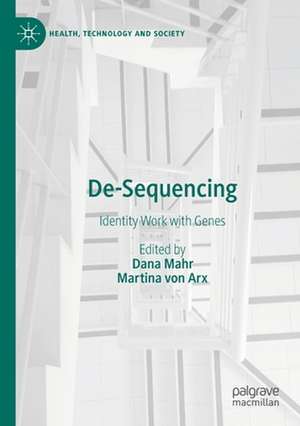De-Sequencing: Identity Work with Genes: Health, Technology and Society
Editat de Dana Mahr, Martina von Arxen Limba Engleză Paperback – 9 dec 2021
| Toate formatele și edițiile | Preț | Express |
|---|---|---|
| Paperback (1) | 635.80 lei 43-57 zile | |
| Springer Nature Singapore – 9 dec 2021 | 635.80 lei 43-57 zile | |
| Hardback (1) | 640.24 lei 43-57 zile | |
| Springer Nature Singapore – 8 dec 2020 | 640.24 lei 43-57 zile |
Din seria Health, Technology and Society
-
 Preț: 280.10 lei
Preț: 280.10 lei - 5%
 Preț: 716.09 lei
Preț: 716.09 lei - 5%
 Preț: 841.37 lei
Preț: 841.37 lei - 18%
 Preț: 895.58 lei
Preț: 895.58 lei - 15%
 Preț: 642.51 lei
Preț: 642.51 lei - 18%
 Preț: 781.00 lei
Preț: 781.00 lei -
 Preț: 385.84 lei
Preț: 385.84 lei -
 Preț: 391.22 lei
Preț: 391.22 lei -
 Preț: 423.84 lei
Preț: 423.84 lei -
 Preț: 390.46 lei
Preț: 390.46 lei - 5%
 Preț: 458.23 lei
Preț: 458.23 lei - 5%
 Preț: 719.19 lei
Preț: 719.19 lei - 15%
 Preț: 584.92 lei
Preț: 584.92 lei - 5%
 Preț: 372.97 lei
Preț: 372.97 lei - 5%
 Preț: 717.00 lei
Preț: 717.00 lei - 15%
 Preț: 639.73 lei
Preț: 639.73 lei - 15%
 Preț: 640.24 lei
Preț: 640.24 lei -
 Preț: 392.60 lei
Preț: 392.60 lei - 15%
 Preț: 640.88 lei
Preț: 640.88 lei -
 Preț: 388.13 lei
Preț: 388.13 lei - 5%
 Preț: 725.96 lei
Preț: 725.96 lei - 5%
 Preț: 462.63 lei
Preț: 462.63 lei -
 Preț: 389.88 lei
Preț: 389.88 lei -
 Preț: 387.75 lei
Preț: 387.75 lei - 18%
 Preț: 786.36 lei
Preț: 786.36 lei - 5%
 Preț: 370.38 lei
Preț: 370.38 lei - 15%
 Preț: 641.71 lei
Preț: 641.71 lei - 5%
 Preț: 368.37 lei
Preț: 368.37 lei - 18%
 Preț: 786.66 lei
Preț: 786.66 lei - 5%
 Preț: 366.56 lei
Preț: 366.56 lei -
 Preț: 384.86 lei
Preț: 384.86 lei
Preț: 635.80 lei
Preț vechi: 748.00 lei
-15% Nou
Puncte Express: 954
Preț estimativ în valută:
121.66€ • 127.36$ • 100.67£
121.66€ • 127.36$ • 100.67£
Carte tipărită la comandă
Livrare economică 07-21 aprilie
Preluare comenzi: 021 569.72.76
Specificații
ISBN-13: 9789811577307
ISBN-10: 9811577307
Pagini: 181
Ilustrații: XVII, 181 p. 7 illus., 6 illus. in color.
Dimensiuni: 148 x 210 mm
Greutate: 0.29 kg
Ediția:1st ed. 2020
Editura: Springer Nature Singapore
Colecția Palgrave Macmillan
Seria Health, Technology and Society
Locul publicării:Singapore, Singapore
ISBN-10: 9811577307
Pagini: 181
Ilustrații: XVII, 181 p. 7 illus., 6 illus. in color.
Dimensiuni: 148 x 210 mm
Greutate: 0.29 kg
Ediția:1st ed. 2020
Editura: Springer Nature Singapore
Colecția Palgrave Macmillan
Seria Health, Technology and Society
Locul publicării:Singapore, Singapore
Cuprins
1. Introduction.- Part I Science and Medicine.- 2. Personalised Medicine: Problems of translation into the human domain.- 3. Contemporary Future Parents: From tentative pregnancy and moral pioneers to educated moral gamblers.- Part II Philosophy of Biology.- 4. Developmental narratives.- 5. Epigenetics, responsiveness and embodiment.- 6. Space and time of developmental narratives.- Part III Societal Contexts.- 7. Data mining in systems medicine and the project of solidarity – the interface of genomics and society revisited.- 8. Experimenting with solidarity in biomedicine: from practice to prin-ciple?.- 9. The moral making of data rich personalised medicine.- Part IV Families.- 10. An ordering of letters: my own personal genome.- 11. Illness in the world of the genome.- 12. How personal is the genome? The shadow of genetic predictions.- Part V Individual Experiences.- 13. Lived genome phenomenology. Exploring the genetics of chronic inflammatory bowel diseases.- 14. Existential storytelling in a genomic world.
Notă biografică
Dr. Dana Mahr is senior researcher and lecturer at the University of Geneva, Switzerland. Her research centers on how we make sense out of science, technology, and medicine from a comparative and interdisciplinary perspective.
Martina von Arx, M.A. is a PhD candidate at the University of Geneva, Switzerland. She explores how health professionals and patients experience digital technologies as part of the current developments of personalized health in Switzerland.
Textul de pe ultima copertă
Are you your genes? De-Sequencing: Identity Work with Genes explores this perplexing question, showing how different forms of knowledge must be contextualized to become meaningful. It is generally assumed that the genomic sequence adds up to the identity-forming material life is made of. Yet identity cannot itself adopt the form of a sequence. As the authors in this volume show, the genome must be ‘de-sequenced’ by human language to render it interpretable and meaningful in a social context. The book unpacks this type of ‘sequence-speech’ in engaging detail, adopting a personal, social, cultural, and bio-political approach to examine the transformation of human identity and reflexivity in the era of genetic citizenship.
Caracteristici
Explores contemporary impacts of genomic knowledge from different angles – such as the personalization of health, individual identity-work, new trends in policy making, and the social consequences of advancements in the medical sciences Establishes a discursive and interdisciplinary framework for those who (in their academic or professional fields) have to deal with the omnipresence and rising power of genetics in our society Offers a valuable cutting-edge resource for scholars and readers interested in philosophy, sociology, anthropology, STS and cognate disciplines within the social sciences and humanities more broadly
